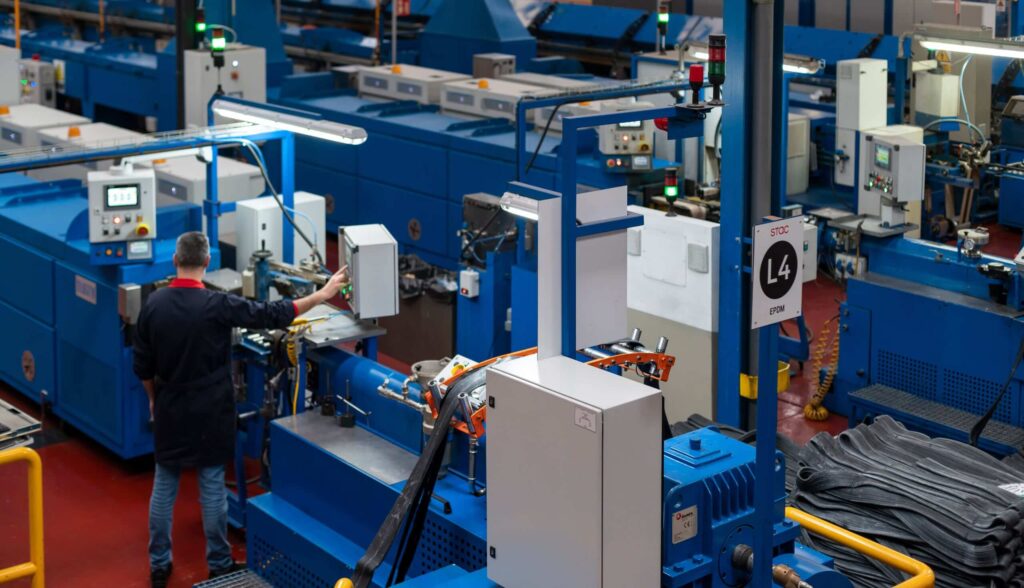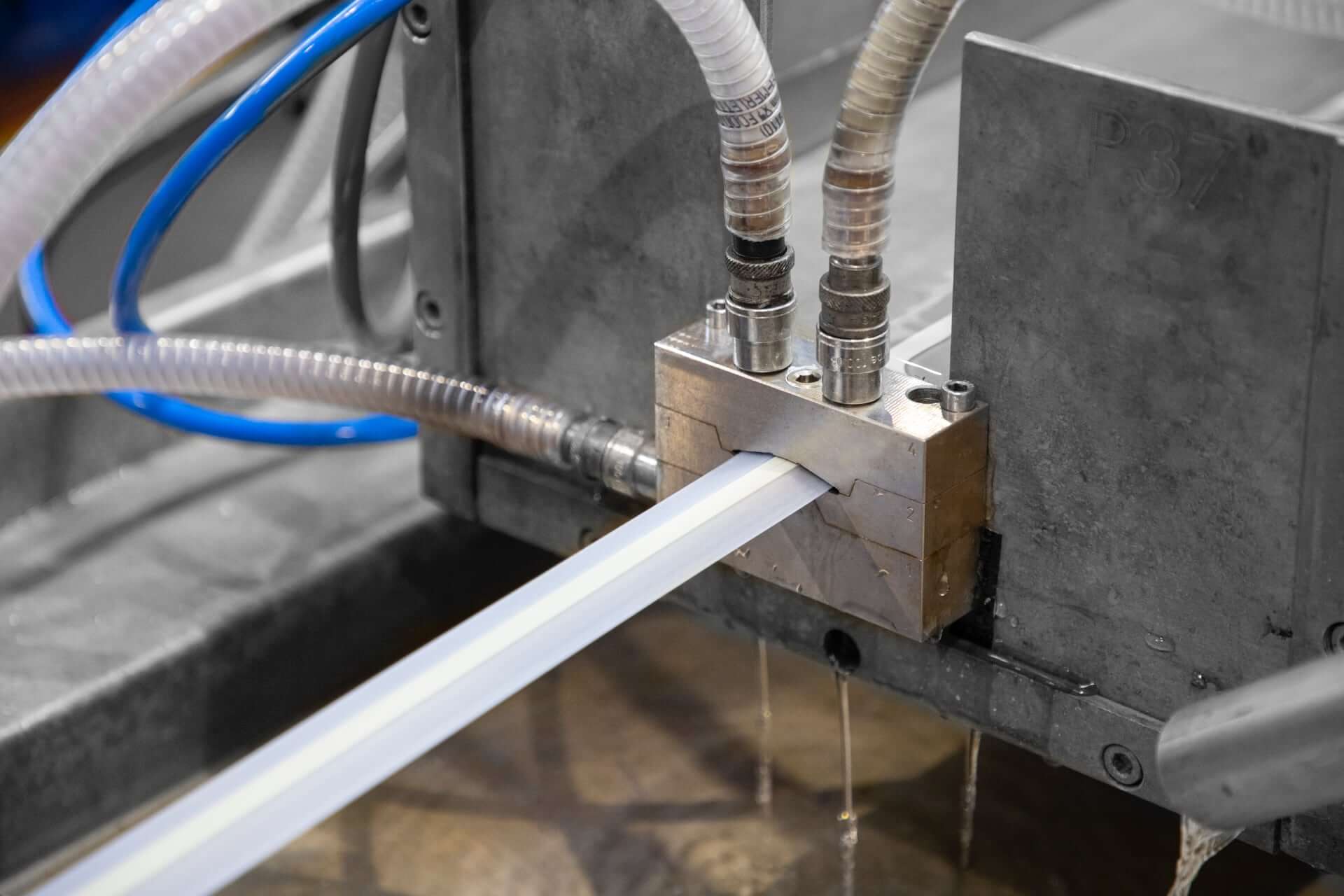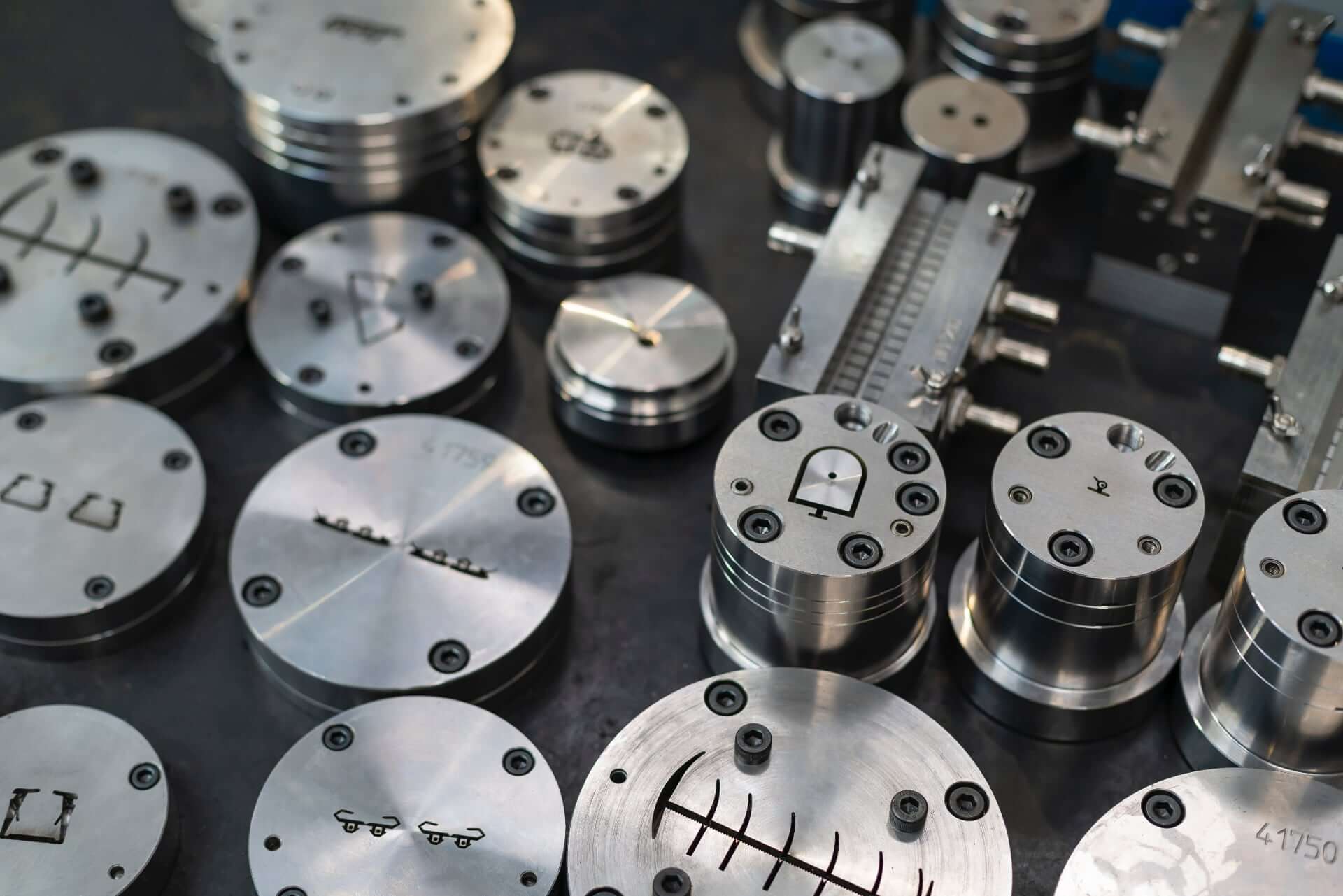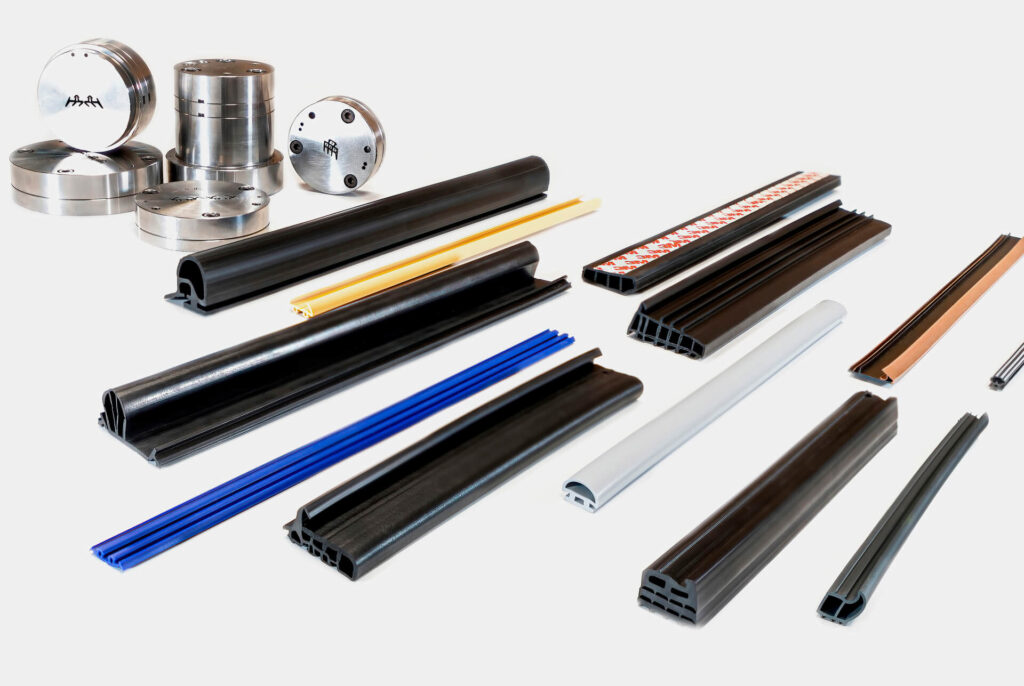PRIMARY PROCESSES
Polymer extrusion
At STAC we are specialists in polymer extrusion and we accompany our customers throughout the manufacturing process.

PRIMARY PROCESSES
Polymer extrusion
At STAC we are specialists in polymer extrusion and we accompany our customers throughout the manufacturing process.
What is polymer extrusion?
Polymer extrusion is a mechanical industrial process, where a moulding action is carried out on the plastic which continuously flows due to pressure and propulsion before melting and passing through a mould known as a die, which gives the profile the desired shape.
The molten polymer (or in visco-elastic state) is forced to pass through the die, by means of the thrust generated by the rotating action of a screw feeder (Archimedes screw) that rotates concentrically in a chamber at controlled temperatures called the barrel, with a millimetre separation between both components. The polymeric material is fed by means of a hopper at one end of the machine and due to the action of propulsion and heating by electrical resistors, it melts, flows and mixes in the barrel and comes out the other end through the die to produce a preset geometric profile.

Frequently asked questions about polymer extrusion
This is a question that many of our customers ask.
Depending on the application that the profile will have, we will choose the most suitable plastic according to its properties and characteristics.
These are some of the main ones:
- Polyamide 66+25%GF: Polyamide profiles have a very high melting temperature and maintain their mechanical properties with temperature changes. These characteristics, together with their low thermal conductivity, make them ideal to use as thermal bridge breaks in windows that are going to be lacquered.
- PVC: It is one of the most used plastics in industry and architecture. Thanks to its characteristics of low thermal conductivity, durability, abrasion resistance, mechanical resistance and impact, it is suitable for certain applications in building and construction. It is available in a wide variety of colours, making it ideal for use in aesthetic profiles.
- ABS: It has one of the lowest thermal conductivity coefficients among rigid plastics, making it a very interesting option for insulating applications that will not be subjected to temperatures above 87ºC
- Other plastics: At STAC we manufacture profiles from other thermoplastics such as polycarbonate (PC), ASA, SAN, etc. We are always willing to assist our clients in the manufacture of any thermoplastic they need.
Don’t worry, if you want to know more about this point, please contact us.
At STAC we have our own machining workshop where we make our extrusion tools.
The quality of our profiles depends directly on the accuracy of our extrusion tools. That is why we have a team of design and mechanical parts manufacturing engineers who know the requirements of this process. This allows us to choose the right steel and heat treatments to process the various plastic materials.
Importance of tooling:
- Choice of steel composition: Steel alloys meet different needs according to the thermoplastic to be processed. For example, PVC is a corrosive material in the molten state so the steel in contact with it needs to be stainless. For the processing of abrasive materials such as polyamide with fibreglass, it is necessary to use steels that are susceptible to being tempered to high hardness.
- Choice of heat treatment: Heat treatment is of vital importance to ensure the durability of tooling. In the manufacture of polyamide profiles with fibreglass, the tools suffer abrasion so a good tempering with a high hardness is essential for the steel to resist. In certain applications a nitride is also necessary that provides surface hardness.
- Machining: For the manufacture of the tools it is important to know the requirements for their manufacture, since the steel alloys are used to meet specific demands such as machining, engraving, polishing … which will depend on the composition of the steel.
At STAC we guarantee our customers the extrusion tools indefinitely, replacing any that suffer wear and tear due to their use at no cost to the client.
If you want to know more about this point, we can help you. Contact us.
The answer is yes. They are very important.
To manufacture plastic profiles with the highest quality, our machines have the following characteristics:
- Precise temperature control: the machine must have a precise temperature control system to ensure that the molten polymer maintains the proper temperature throughout the extrusion process, from the inlet of the pellet through the hopper to its passage through the die. This helps to avoid problems such as changes in the fluidity of the molten material that could cause problems during manufacturing and the consequent loss of dimensional accuracy of the profiles.
- High precision extrusion and dosing system: An extrusion and dosing system that allows precise control of the polymer extrusion volume and speed through the die is a must. This ensures a uniform distribution of the material and avoids problems such as dimensional variations in profiles and changes in the surface finish due to pressure jumps.
- Temperature controlled cooling: Solidification times of plastics are of vital importance to ensure dimensional stability of profiles and optimal surface finish. Thus, the cooling temperature must be adjusted according to the speed and nature of the material manufactured.
- Monitoring and logging capability: It is important that the machine has monitoring and data logging capabilities to allow detailed tracking of process parameters such as temperature, pressure, speed, times, among others. This facilitates the identification of potential problems and contributes to the continuous improvement of the manufacturing process.
- Safety: Our machines are fully robotised so that no worker comes into contact with moving parts of the line such as trolleys or cutting saws.
If you want to know more about our capabilities in extrusion of thermoplastic rigid profiles, please contact us.
The stability in the extrusion processes of rigid thermoplastic profiles depends on different factors such as pressure, temperature, speed, surface finish of the dies or moulds, wear of parts, etc.:
With this number of variables it is essential to perform periodic control of the manufacturing process to adjust the extrusion parameters according to the dimensional variations that may arise. Dimensional control of the main dimensions of the profiles is carried out every 2 hours to guarantee the quality of the profiles.
We have high precision measuring equipment that gives us the exact values of the measurements of a profile.
Once the samples of a new profile are manufactured, we keep them stored for 1 year to check periodically. In this way we can visualize the deformations they acquire during that time and the percentage of growth it experiences due to the gain of moisture.
At STAC we are committed to the quality of our products and technical advice to ensure the trust of our customers.
Integral solution for extrusion of rigid thermoplastic profiles
We take care of every stage of the extrusion process, ensuring quality and efficiency at every step.

At STAC, we want to be your comprehensive supplier of plastic profiles
We want to provide you with a comprehensive service and we take care of the entire process, from the initial design to the final delivery of the finished product where you request it.
Our priority is to help the customer achieve their goals
At STAC, we are committed to excellence and customer satisfaction.
At STAC, we are committed to excellence and customer satisfaction. We would like to be your integral partner in the manufacture of extruded thermoplastic profiles, offering high quality solutions and added value at every step of the process. We are ready to work closely with you and meet your specific requirements.
Don’t hesitate to contact us to discuss your projects and how we can help you achieve your goals.

Post-extrusion processes
After the rigid profile extrusion process, it is common to perform a series of subsequent processes to obtain bars with the desired characteristics.
Our post-extrusion processes are the following:
Gluing masking tape
For polyamide profiles that are to be lacquered and are intended to preserve the natural colour of the profile, we have a process of bonding protective masking tape to protect the profile during the lacquering process. Once the process is finished the tape is removed, leaving the surface clean and homogeneous.
Gluing of insulating foams
In certain door and window systems, where additional thermal insulation performance is needed, a foam profile needs to be added to reduce energy losses due to convection in the chambers between the profiles. To this end, STAC offers a service of gluing insulating foams to the surface of the profiles.
Contact us
We’ll be happy to provide help for your projects and resolve any doubts as soon as possible